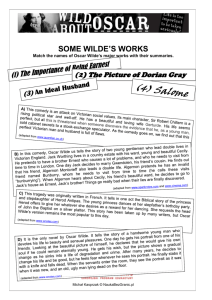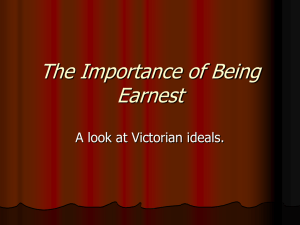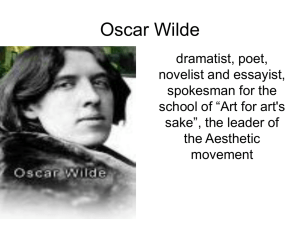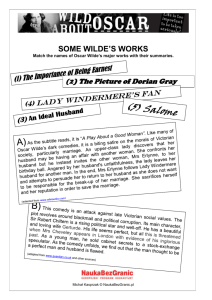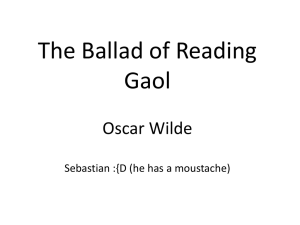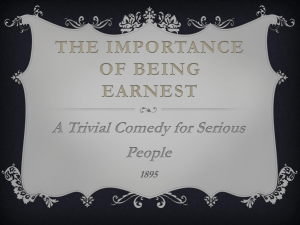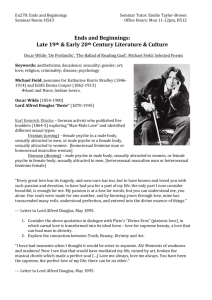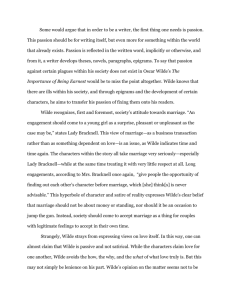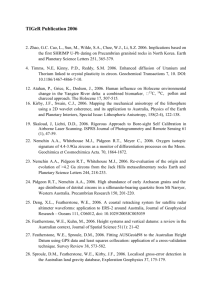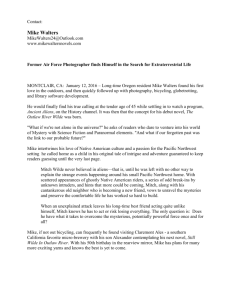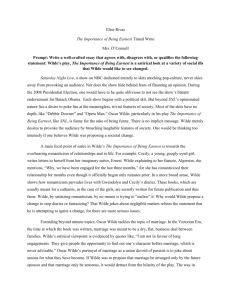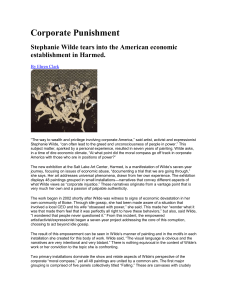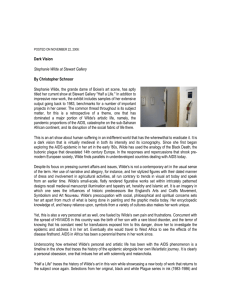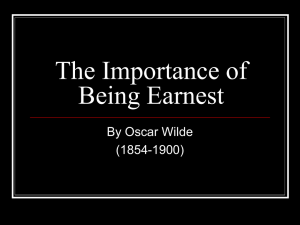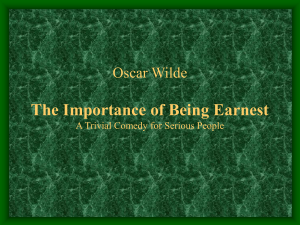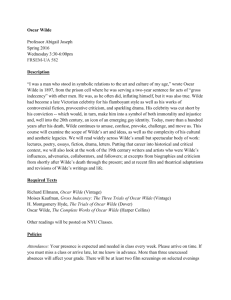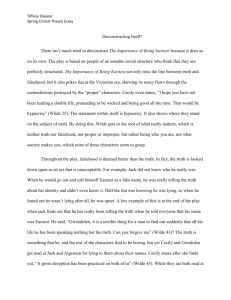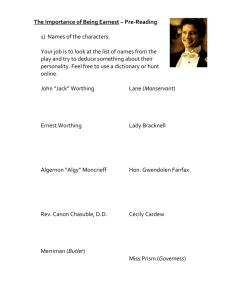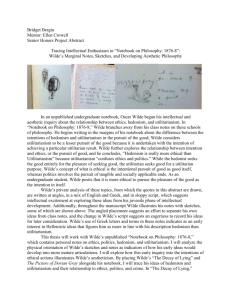oscar-wilde
advertisement
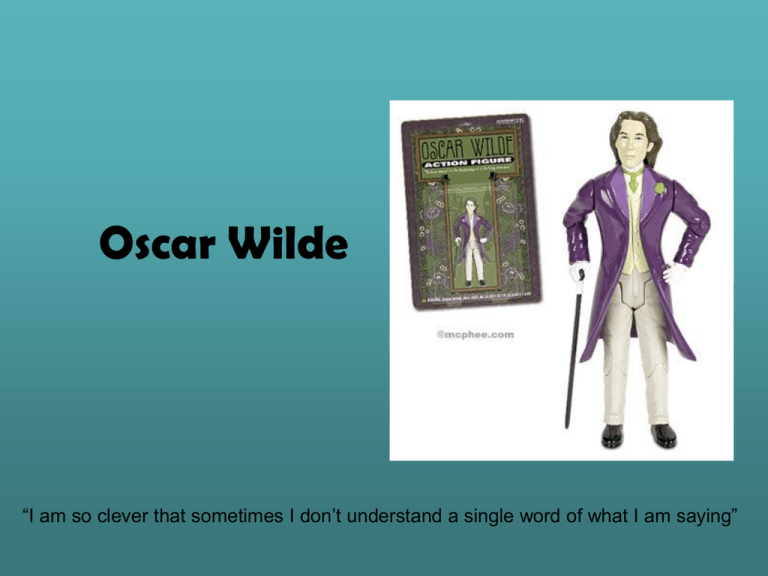
Oscar Wilde “I am so clever that sometimes I don’t understand a single word of what I am saying” “It is only shallow people who do not judge by appearances” • • • • Born in Dublin, 16 October 1854 Educated at Trinity College Settled in London Flamboyant style, contempt for conventional values • Belief in aestheticism – the principle of art for the sake of beauty alone “All art is quite useless” • Hung out with the likes of Henry James, WB Yeats • Went on a lecture tour of North America • Acted in G&S operetta – was lampooned, but still celebrated widely as a well-known personality and a wit. A celebrity! “I can resist everything except temptation” • 1880s: wrote reviews, edited a women’s magazine, published a volume of poetry • 1891: The Picture of Dorian Gray: attacked as scandalous/immoral. • Met Lord Alfred Douglas (his lover) and hit his literary stride • Wrote Lady Windermere’s Fan, A Woman of No Importance, An Ideal Husband and The Importance of Being Earnest over next couple years “We are all in the gutter, but some of us are looking at the stars” • All experienced success in the West End, but IOBE regarded as his masterpiece. • Achieved the status of the ‘darling’ of London society IOBE • In many ways, The Importance of Being Earnest was an artistic breakthrough for Wilde, something between selfparody and a deceptively flippant commentary on the dramatic genre in which Wilde had already had so much success. Wilde's genre of choice was the Victorian melodrama, or “sentimental comedy,” derived from the French variety of “well-made play” popularized by Scribe and Sardou. In such plays, fallen women and abandoned children of uncertain parentage figure prominently, letters cross and recross the stage, and dark secrets from the past rise to threaten the happiness of seemingly respectable, well-meaning characters. “Life is far too important to be taken seriously “ • In Wilde's hands, the form of Victorian melodrama became something else entirely. Wilde introduced a new character to the genre, the figure of the “dandy” (a man who pays excessive attention to his appearance). This figure added a moral texture the form had never before possessed. The character of the dandy was heavily autobiographical and often a stand-in for Wilde himself, a witty, overdressed, self-styled philosopher who speaks in epigrams and paradoxes, ridicules the cant and hypocrisy of society's moral arbiters, and selfdeprecatingly presents himself as trivial, shallow, and ineffectual. In fact, the dandy in these plays always proves to be deeply moral and essential to the happy resolution of the plot. “In this world there are only two tragedies. One is not getting what one wants, and the other is getting it” • The Importance of Being Earnest was an early experiment in Victorian melodrama. Part satire, part comedy of manners, and part intellectual farce, this play seems to have nothing at stake because the world it presents is so blatantly and ostentatiously artificial. Below the surface of the light, brittle comedy, however, is a serious subtext that takes aim at self-righteous moralism and hypocrisy, the very aspects of Victorian society that would, in part, bring about Wilde's downfall. “Education is an admirable thing. But it is well to remember from time to time that nothing that is worth knowing can be taught” • 1895: a series of catastrophes led to personal humiliation, social/professional/financial ruin • Two weeks after IOBE opened, the Marquess of Queensbury (Lord Alfred’s belligerent, homophobic father) publicly accused him of “posing as a somdomite (sic)”. “The English are always degrading truths into facts. When a truth becomes a fact it loses all its intellectual value” • Wilde sued for libel and lost • Criminal Law Amendment Act of 1885: homosexual acts punishable by up to two years’ imprisonment • He didn’t flee, and was arrested • After two trials, he was convicted and sentenced to prison for two years “It is a very sad thing that nowadays there is so little useless information” • Wilde may have remained in England for a number of reasons, including selfdestructiveness, denial, desperation, and a desire for martyrdom. However, some historians have suggested that Wilde's relentless persecution by the government was a diversionary tactic. Lord Alfred's older brother was reportedly also having a homosexual affair with Archibald Philip Primrose, Lord Rosebery, the man who would become prime minister. “Religions die when they are proved to be true. Science is the record of dead religions” • Queensberry was apparently so outraged that he threatened to disclose the relationship, and the government reacted by punishing Wilde and his lover in an effort to assuage the marquess. In any case, Wilde served his full sentence under conditions of utmost hardship and cruelty. Following his release from prison, his health and spirit broken, he sought exile in France, where he lived out the last two years of his life in poverty and obscurity under an assumed name. He died in Paris in 1900.
